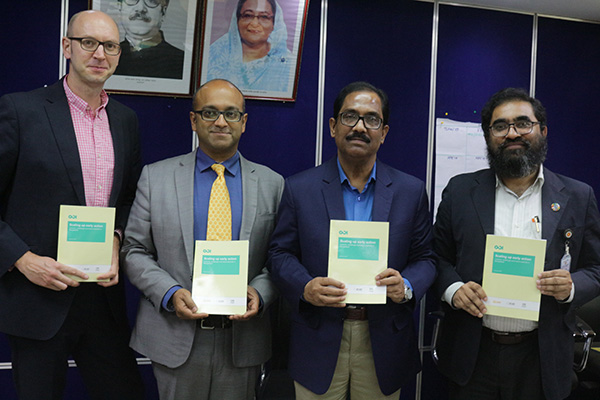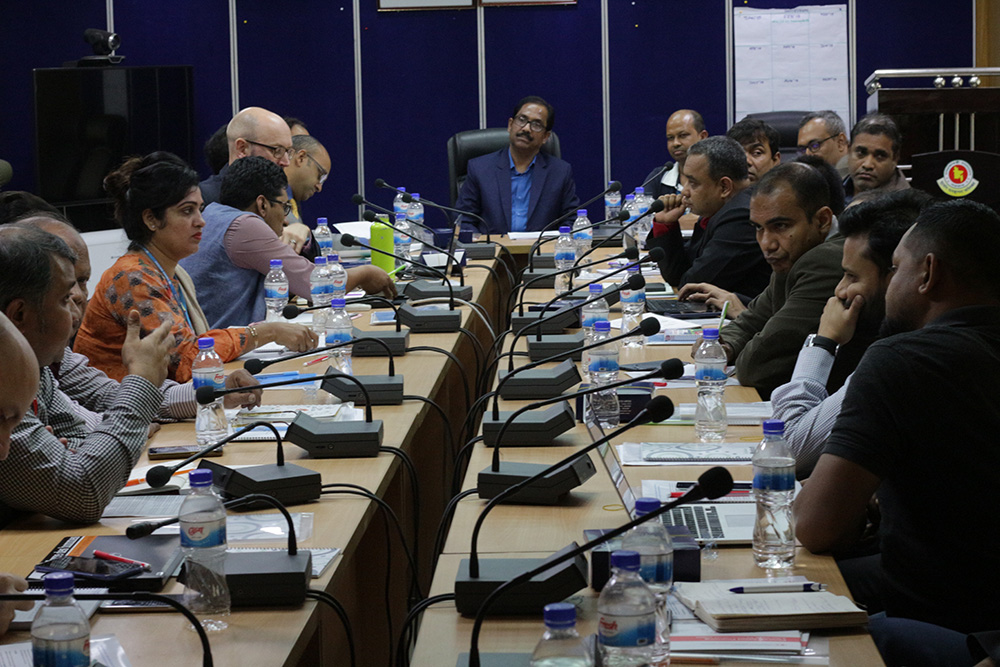
Bangladesh, January 29, 2019: Forecast based Action (FbA) approach is becoming an increasingly significant future financial response mechanism for disaster management. This approach has potential to reduce losses and suffering of the victims, whilst also saving money during rescue and relief distribution. CARE Bangladesh has conducted a study on FbA in collaboration with Overseas Development Institute (ODI)-UK, START Network-UK, Red Cross and Red Crescent Climate Center, Netherlands. The study assesses efforts to date in Bangladesh and aims to develop strategies for overcoming barriers to the formalization of future FbA mechanisms.
A launching event of the study report titled Scaling up early action: Lessons, Challenges and Future Potential in Bangladesh was held on 29 January, 2019, at the Department of Disaster Management (DDM) in Mohakhali, Dhaka. Honourable Chief Guest Abu Syed Mohammad Hashim, DG-DDM has formally launched the study report. He mentioned: ‘For effective utilization of the allocated resources of Government and partner agencies the Forecast based action could be a viable vehicle. If we are able to take early action based on forecast to mitigate the loss and damage before disaster happens, that will lead to both essential and effective early response saving both lives and properties”
The lead researcher Thomas Tanner, PhD from Overseas Development Institute (ODI)-UK presented the key findings of the research and the event was facilitated by Kaiser Rejve, Director –Humanitarian and Resilience program of CARE Bangladesh. Mr. Zia Choudhury, Country Director of CARE Bangladesh gave the welcome speech and highlighted the importance of Forecast based early action of supporting the disaster affected people in needs. Representatives from several government, NGO, INGO and UN organizations were present at the event and participated in open discussion on the future prospects of FbA.
The objective of this event was to bring relevant stakeholders together for forecast based action in Bangladesh and consolidate the experience and lessons while sharing report findings with current and potential stakeholders on the issue.
The research is jointly led by Overseas Development Institute (ODI) and CARE Bangladesh, funded by Department for International Development (DFID) under its WISER (Weather Information Services) project. . Key partners include START Network, Red Cross Red Crescent Climate Centre- Netherlands, & University of Sussex, UK. Literature and document reviews as well as Key informant Interviews were the methodologies for this research.
The research project investigates the technical, economic and institutional challenges to scaling up FbA in Bangladesh, with a particular focus on cyclones and floods. This included a learning exercises of an FbA pilot in collaboration with the German Red Cross in Bangladesh and Bangladesh Red Crescent Society in Bogura.
This Research project stated that, the concept of FbA is not new to Bangladesh but triggers for action are often unclear. The key findings from scaling up FbA research revealed that, taking early action when forecasts prove inaccurate has potential implications for accountability and perceived misallocation of limited resources. Institutional incentives and finance are still skewed towards relief. Post-disaster response is seen as more visible and defensible, forming a barrier to early actions.
If targeted properly, early actions could help enhance resilience of the climate or hazard vulnerable community. Scaling up of FbA could help reform prevailing biases in disaster management by making targeting and delivery of aid more transparent, equitable and needs-based. Forecasting is limited but has future potential. In terms of choosing disaster for forecasting, tidal influence makes it difficult to forecast flooding in the southern and coastal zones, while the inaccuracy of cyclone forecasting leaves a limited window for early actions. Riverbank erosion and monsoon flood forecasts have future potential, along with efforts to improve impact-based forecasting.
The session discussion particularly emphasized that Value for Money analysis with better evidence on the (cost)-effectiveness of FbA approaches. The study report suggested improved food security, reduced lending costs and lower anxiety/depression among those taking early action before disasters. These findings will encourage new dialogues in FbA between the key stakeholders such as Government agencies, academia, research institutions, UN agencies, NGOs, INGOs and private institutions.
Contact: Md Jafar Iqbal, Program Manager, Humanitarian and Resilience, CARE Bangladesh.
Mobile: 01915177117 and Email: jafar.iqbal@care.org

View Details Publication